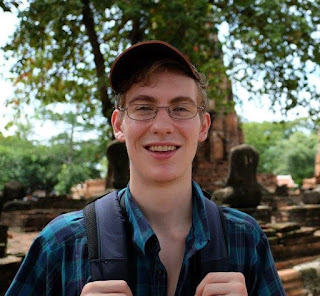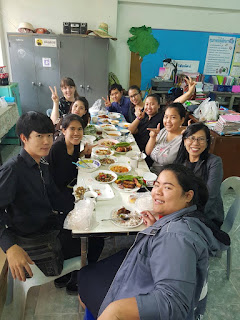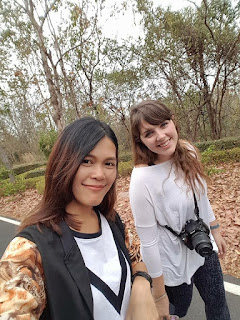Justin Long was born and raised in Baltimore City. He is a 2016-17 Fulbright-AMCHAM ETA placed at Jorakhe Wittayayon School in Khon Kaen Province, Northeastern of Thailand. Justin studied linguistics at Hamilton College. When he gets back to the United States, he wants to be a caseworker and to go to graduate school to study social science. In his free time, he enjoys running in the fields behind his school and going into town to look around.
Food and cooking are foundational. In a literal sense, they provide the necessary conditions for continued survival, but they also furnish some of the most basic elements upon which societies are based. From the intimate familial relationships built together in the kitchen, in the field and around the table, to its tremendous influence on the organization and logic of entire economic and political systems, it’s hard to overstate the importance of food in our lives. Like most Americans, I grew up eating a lot of processed food with very little concern for where it came from or what exactly I was eating, but that changed when my older brother came home from his sophomore year at college. He had become deeply concerned with food issues while studying environmental science, and had been working on an organic community farm for several months. His newfound passion launched a serious debate in my family about food, ethical responsibility, and mindful consumption, which culminated in his decision to start his own organic farm at my mom’s house in Baltimore City.
In response to my brother’s efforts, I began to read about food issues and cook for myself more often. I had always enjoyed cooking, but the more I learned, the less I was interested in the options available at my college dining hall, and the more I wanted to have control over what I was eating. As I learned to master a few dishes, I began searching for new recipes, and this led me to some basic Thai curries. While those first curries I made were distinctly more American than Thai, the simplicity of the cooking process and the incredibly strong flavors it produced fascinated me. When I realized I might have the opportunity to travel to Thailand, my mind raced with the possibilities of everything I would find that would shatter any idea I had about what Thai food was. During the Fulbright application process, I was told several times to by faculty to tone down my obsession with Thai cuisine. The dishes that I was familiar with, that shaped my entire concept of the food I would be eating of the next year, were exclusively either coconut-based curries or those heavily sautéed in basil and lemongrass. I understood that my view was limited, and as I got closer and closer to September, I got nervous that I might not like the food as much as I was imagining.
All those fears were immediately quelled after my first meal in Bangkok. It was a bowl of green curry: spicy, complex, rich and teaming with Thai eggplants, which were completely novel to me. That first day was overwhelming and challenging, but also heartening, and that first bowl of curry assured me that the food would be even better than I had hoped. Over the next month my infatuation only became more intense. I found that while the foods I had loved in America were even better here, there were hundreds of different dishes that I had never even imagined. When I wasn’t eating, I was thinking about pork dumpling soup with egg noodles, or pineapple fried rice with peanuts, or all of the amazing things I would be eating for the rest of the year.
As the initial shock of fish sauce wore off, I began to really enjoy many local dishes. They weren’t sweet and bright-colored like the ones I had come to associate with Thai cuisine, in fact many of them were extremely bitter, salty and dark, but there was just as much nuance and complexity, and I came to appreciate these dishes more because I had to work hard to understand and enjoy them.
Learning more about the other teachers’ farms, the prominent place of agriculture in Khon Kaen, and the highly localized nature of food production here led me to a much greater appreciation of the quality of ingredients, their history, and the region more broadly. When I became more serious about learning the Thai language, I found that one of the best ways to practice and learn new vocabulary was to talk about food. The language barriers that had seemed vast when I first arrived began to shrink a little, and I began to understand more and feel more understood. New dishes provided me with fresh things to point to and attempt to illicit words in Thai. But more importantly, the social conditions that are created when the other teachers stop what they’re doing, eat together and focus their time and energy on one another, have allowed me many dedicated hours of practice and made me feel more a part of the community than anything else.
I am leaving today for Chiang Rai to start a 5-week internship on a farm there. Going to a very different region, with its own cuisine, dialect differences and cultural nuances, is a bit daunting but also exhilarating. As I make the transition, I’ll be engaging with food, but this time in a much more purposeful way, and in so doing will come to a much more complete understanding of Chiang Rai, Khon Kaen and Thailand as a whole.
Learning more about the other teachers’ farms, the prominent place of agriculture in Khon Kaen, and the highly localized nature of food production here led me to a much greater appreciation of the quality of ingredients, their history, and the region more broadly. When I became more serious about learning the Thai language, I found that one of the best ways to practice and learn new vocabulary was to talk about food. The language barriers that had seemed vast when I first arrived began to shrink a little, and I began to understand more and feel more understood. New dishes provided me with fresh things to point to and attempt to illicit words in Thai. But more importantly, the social conditions that are created when the other teachers stop what they’re doing, eat together and focus their time and energy on one another, have allowed me many dedicated hours of practice and made me feel more a part of the community than anything else.
 |
| There are gai yang stands all over Khon Kaen. |
I am leaving today for Chiang Rai to start a 5-week internship on a farm there. Going to a very different region, with its own cuisine, dialect differences and cultural nuances, is a bit daunting but also exhilarating. As I make the transition, I’ll be engaging with food, but this time in a much more purposeful way, and in so doing will come to a much more complete understanding of Chiang Rai, Khon Kaen and Thailand as a whole.

























